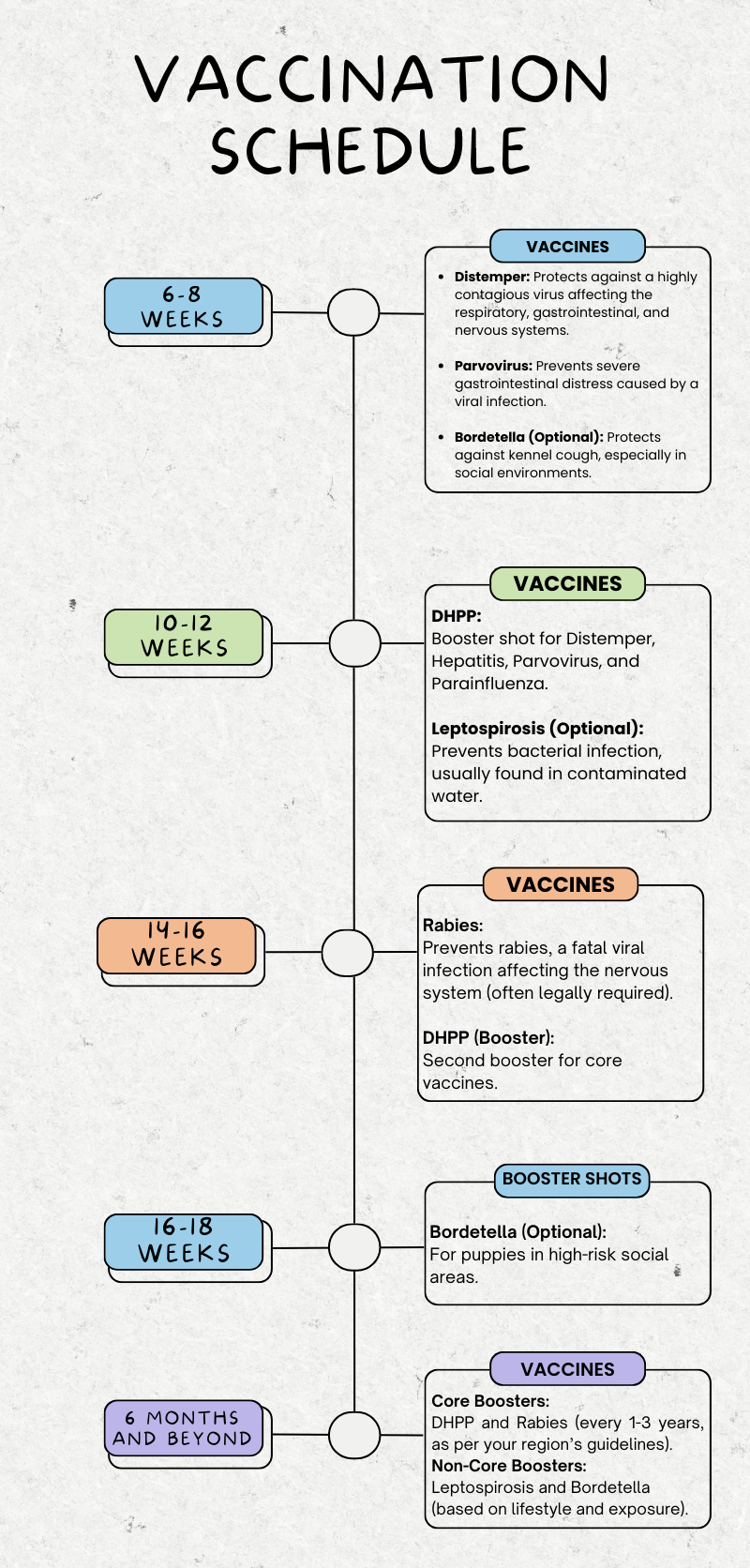Dog Vaccination Schedule. A Guide for Every Dog Owner
Discover the essential dog vaccination schedule with Sploot. Learn everything about dog vaccine options to keep your pet healthy and fully protected.

Vaccines are vital for protecting dogs from several fatal viruses and diseases. It strengthens their immune system and prevents infections. Pet parents need to follow a proper vaccination schedule to make sure your pup stays healthy and protected from such diseases. Apart from this, pet parents also need to keep up with regular vet check-ups to maintain their dogs’ fitness and detect early signs of any health issues.
Let’s check out more about vaccination schedules, including core and non-core vaccines, booster doses, and important pre-and-post-care tips to keep your dog safe and comfortable during the vaccination process.
Dog Vaccination: Understanding Core and Non-core Vaccines
Essential vaccines for dogs are of two types- core and non-core vaccines. Getting these on their specified times contribute to your pup’s well-being by protecting them from a range of viruses. It’s necessary to keep up with these vaccinations to ensure peak immunity.
Core Vaccines
.png)
Core vaccines are doses that are mandatory for all dogs. These protect the pet against some seriously contagious diseases. Listed below are a few core vaccines:
- Rabies: A fatal viral disease affecting the nervous system. Rabies vaccination is required by law in many regions.
Cost: ₹500-₹1,000. - Canine Parvovirus: A highly contagious virus causing severe gastrointestinal issues. This majorly affects unvaccinated puppies.
Cost: ₹700-₹1,200. - Canine Distemper: A viral disease that affects the respiratory, gastrointestinal, and nervous systems. This is usually spread through direct and indirect contact with affected animals.
Cost: ₹800-₹1,500.
Non-Core Vaccines
Non-core vaccines are shots that are optional and depend on the dog’s environment, activities, and lifestyle. But most loving pet parents get these doses for their pups to keep them as safe as possible. Some non-core vaccines include:
- Bordetella (Kennel Cough): Recommended for dogs that often interact with other dogs in crowded environments.
Cost: ₹800-₹1,200. - Canine Influenza: Protects against the flu virus, particularly for dogs that often visit kennels or dog parks.
Cost: ₹1,000-₹1,500.

Dog Vaccination Schedule
Vaccination for dogs have a certain schedule and timeline to ensure your pup is safe from infections and their immunity is built up as they age. Generally, vaccines start from about 6 weeks old and then get continued as yearly booster doses.
Puppy Vaccination Schedule
Vaccination protects puppies from potentially life-threatening diseases. When puppies turn 6+ weeks, they start teething and tend to chew or eat things that could be harmful. This makes it all the more important for them to get their shots and booster shots early on. The following schedule covers core vaccines and their booster doses.
6-8 Weeks:
- Distemper: A highly contagious virus affecting the respiratory, gastrointestinal, and nervous systems.
Cost: ₹500-₹700. - Parvovirus: A viral infection that causes severe gastrointestinal distress.
Cost: ₹600-₹800. - Bordetella (Optional): Prevents kennel cough, especially if your puppy will be in contact with other dogs.
Cost: ₹800-₹1,200.
10-12 Weeks:
- DHPP (Distemper, Hepatitis, Parvovirus, Parainfluenza): Booster for the core vaccines.
Cost: ₹700-₹1,200. - Leptospirosis (Optional): Prevents bacterial infection, usually found in contaminated water sources.
Cost: ₹800-₹1,500.
14-16 Weeks:
- Rabies: Prevents rabies, a fatal viral infection affecting the nervous system. Often required by law.
Cost: ₹500-₹1,000. - DHPP (Booster): Second booster shot for Distemper, Hepatitis, Parvovirus, and Parainfluenza.
Cost: ₹700-₹1,200.
16-18 Weeks:
- Booster Shots:
- Bordetella (Optional): If your puppy continues to interact with other dogs in high-risk areas.
Cost: ₹800-₹1,200.
6 Months and Beyond:
- Boosters: Continue to give booster shots annually or as recommended by your vet for the core vaccines.
- Core: DHPP, Rabies (every 1-3 years depending on your region).
- Non-Core: Leptospirosis and Bordetella, depending on lifestyle.
Note: It is important to ensure your puppy is healthy, well-rested, and not stressed before the vaccination.
Make sure you monitor for side effects like mild fever or tiredness. Offer them water and a comfortable resting space and if possible avoid overexertion.
Adult Dog Vaccination Schedule
For adult dogs, core vaccines are a must on a yearly basis for maintaining immunity. You can also go for non-core vaccines, depending on their lifestyle.
Core Vaccines for Adults (Annual/Biennial):
- Rabies: Typically required by law and should be boosted every 1-3 years depending on local regulations.
- Distemper, Parvovirus, Hepatitis (DHPP): These vaccines are needed every 1-3 years for continued immunity.
Non-Core Vaccines:
- Bordetella: Administered annually for dogs in kennels or social environments.
- Leptospirosis: Recommended for dogs at risk of exposure to contaminated water or certain environments.
- Canine Influenza: If your dog is often in high-traffic dog areas like parks or grooming salons.
Booster Shots:
Booster shots for adult dogs are typically needed every 1-3 years for core vaccines, while non-core vaccines may require annual boosters, based on risk factors.
Key Factors to Consider in Dog Vaccination
When planning a dog’s vaccination schedule, there are several key factors to keep in mind to ensure your dog’s health and protection. Listed below are a few of these.
Regional Disease Risks
In India, certain diseases are more prevalent in specific regions, affecting the vaccination for dogs. For example, Parvovirus and Rabies are widespread in both urban and rural areas. So, getting these is simply all-important.
Now, in coastal regions or cities that have large water bodies, Leptospirosis may be more common due to contaminated water sources. Understanding local risks will help you decide your dog’s vaccine schedule according to the diseases prevalent in your area.
Availability of Vaccines
Reliable vaccination for dogs is again crucial to ensure your pet receives the necessary protection. While you can find vaccinations at local veterinary clinics, pet hospitals, and specialized mobile vaccination services in urban areas, it is recommended to choose trusted clinics with experienced doctors who follow up-to-date vaccination guidelines.
Affordability and Cost
The cost of vaccines in India generally ranges between ₹500 to ₹1,500 depending on the type of vaccine. While some vaccinations like Rabies are relatively affordable, others such as Leptospirosis may be pricier.
However, many clinics offer affordable packages or discounts for multiple vaccines. Pet owners can also inquire about government or NGO-sponsored vaccination programs and drives in their area that provide vaccines at a significantly lower cost.
Benefits of Dog Vaccination
Vaccination for dogs offers a range of benefits that add to their well-being and safety. Many vaccines not just protect them from diseases but also protect you and others around them - be it animals or humans.
Health Protection
Vaccines are the key for defending dogs from deadly diseases such as Canine Parvovirus, Distemper, and Rabies. By getting vaccinated, your dog’s immune system is strengthened, making them less vulnerable to these severe conditions.
Public Safety
Vaccines like Rabies are not only important for your dog's health but also for public safety. Rabies is a zoonotic disease, meaning it can spread from animals to humans. Timely administration of the Rabies vaccine prevents the transmission of rabies and other infectious diseases to those in contact with the dog.
Longevity and Quality of Life
Vaccinated dogs tend to live longer and healthier lives. Regular vaccinations reduce the risk of illness, meaning fewer vet visits and better quality of life as your dog ages.
Possible Side Effects of Dog Vaccination
Vaccinations for dogs are crucial for their health, but like any medical procedure, they can come with some side effects. Understanding what to expect can help pet owners manage their dog’s post-vaccination care.
Common Reactions
After receiving a dog vaccine, it’s common for dogs to experience mild reactions such as:
- Soreness where the vaccine was injected
- Mild fever or tiredness
- Loss of appetite or slight behavioral changes
These reactions usually resolve on their own within 24-48 hours and are a normal part of the immune system responding to the vaccine.
Rare Side Effects
Though rare, some dogs may experience more serious reactions, including:
- Severe allergic reactions (e.g., swelling, difficulty breathing).
- Vomiting or diarrhea.
- Collapse or lethargy lasting more than a day.
When to Seek Help
If your dog shows signs of severe discomfort, difficulty breathing, or persistent symptoms beyond 48 hours, consult your veterinarian immediately. Early intervention can ensure your dog remains safe and healthy after their vaccination.
Care Tips Before and After Dog Vaccination
Proper care before and after vaccination ensures your dog’s comfort and minimizes side effects. This also helps you identify and notice side effects if any.
Pre Vaccination Tips
- Ensure your dog is in good health and not dealing with any illness prior to the vaccination.
- Create a calm, quiet environment for your dog, as stress can affect the vaccination process.
- Keep your dog calm and relaxed before the vaccine appointment. Avoid strenuous activities or travel on the day of the shot.
Post Vaccination Care
- After the dog vaccination, keep an eye on your dog for any signs of mild reactions such as soreness or fever.
- Offer your pup a quiet place to rest, provide fresh water, and keep your dog indoors to avoid exertion for the day.
- Limit exercise for 24-48 hours to allow your dog’s body to recover.
FAQs on Dog Vaccination Schedule
What is the proper vaccination schedule for a dog?
Puppies typically start their vaccinations at 6-8 weeks, with boosters every 3-4 weeks. Adult dogs need annual or tri-annual booster shots depending on the vaccine.
How often does a dog need vaccinations?
Core vaccines are generally given annually or every three years after completing their monthly course of vaccines. Non-core vaccines are given based on risk factors.
What is the 7 in 1 vaccine for dogs?
The 7-in-1 vaccine protects against seven diseases, including Canine Parvovirus, Distemper, Hepatitis, and Leptospirosis, in one shot, simplifying the vaccination process for dogs.
Are there any side effects of the dog vaccine?
Most side effects are mild, like soreness, fever, or tiredness. Serious reactions are rare but may include allergic reactions or vomiting.
Is the rabies vaccine included under dog vaccination safe for my dog?
Yes, the rabies vaccine is safe for dogs and is a core vaccine required by law in many regions to prevent rabies transmission to other animals and humans.
Is vaccination for dogs absolutely necessary?
Yes, vaccinations are crucial to protect dogs from dangerous, preventable diseases, ensuring their health and safety.
What happens if a dog misses a vaccine?
If a dog misses a vaccine, it may leave them vulnerable to diseases. Consult a vet to determine the best course of action for catching up on missed vaccines.
Do indoor dogs need vaccines?
Yes, even indoor dogs need vaccinations to protect them from potential exposure to diseases, as they can still come into contact with other animals or infected objects.
